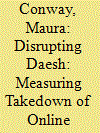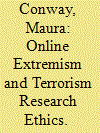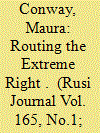|
|
|
Sort Order |
|
|
|
Items / Page
|
|
|
|
|
|
|
| Srl | Item |
| 1 |
ID:
156149


|
|
|
|
|
| Summary/Abstract |
Some scholars and others are skeptical of a significant role for the Internet in processes of violent radicalization. There is increasing concern on the part of other scholars, and increasingly also policymakers and publics, that easy availability of violent extremist content online may have violent radicalizing effects. This article identifies a number of core questions regarding the interaction of violent extremism and terrorism and the Internet, particularly social media, that have yet to be adequately addressed and supplies a series of six follow-up suggestions, flowing from these questions, for progressing research in this area. These suggestions relate to (1) widening the range of types of violent online extremism being studied beyond violent jihadis; (2) engaging in more comparative research, not just across ideologies, but also groups, countries, languages, and social media platforms; (3) deepening our analyses to include interviewing and virtual ethnographic approaches; (4) up-scaling or improving our capacity to undertake “big data” collection and analysis; (5) outreaching beyond terrorism studies to become acquainted with, for example, the Internet Studies literature and engaging in interdisciplinary research with, for example, computer scientists; and (6) paying more attention to gender as a factor in violent online extremism.
|
|
|
|
|
|
|
|
|
|
|
|
|
|
|
|
| 2 |
ID:
164600


|
|
|
|
|
| Summary/Abstract |
This article contributes to public and policy debates on the value of social media disruption activity with respect to terrorist material. In particular, it explores aggressive account and content takedown, with the aim of accurately measuring this activity and its impacts. The major emphasis of the analysis is the so-called Islamic State (IS) and disruption of their online activity, but a catchall “Other Jihadi” category is also utilized for comparison purposes. Our findings challenge the notion that Twitter remains a conducive space for pro-IS accounts and communities to flourish. However, not all jihadists on Twitter are subject to the same high levels of disruption as IS, and we show that there is differential disruption taking place. IS’s and other jihadists’ online activity was never solely restricted to Twitter; it is just one node in a wider jihadist social media ecology. This is described and some preliminary analysis of disruption trends in this area supplied too.
|
|
|
|
|
|
|
|
|
|
|
|
|
|
|
|
| 3 |
ID:
164593


|
|
|
| 4 |
ID:
178923


|
|
|
|
|
| Summary/Abstract |
This article reflects on two core issues of human subjects’ research ethics and how they play out for online extremism and terrorism researchers. Medical research ethics, on which social science research ethics are based, centers the protection of research subjects, but what of the protection of researchers? Greater attention to researcher safety, including online security and privacy and mental and emotional wellbeing, is called for herein. Researching hostile or dangerous communities does not, on the other hand, exempt us from our responsibilities to protect our research subjects, which is generally ensured via informed consent. This is complicated in data-intensive research settings, especially with the former type of communities, however. Also grappled with in this article therefore are the pros and cons of waived consent and deception and the allied issue of prevention of harm to subjects in online extremism and terrorism research. The best path forward it is argued—besides talking through the diversity of ethical issues arising in online extremism and terrorism research and committing our thinking and decision-making around them to paper to a much greater extent than we have done to-date—may be development of ethics guidelines tailored to our sub-field.
|
|
|
|
|
|
|
|
|
|
|
|
|
|
|
|
| 5 |
ID:
171671


|
|
|
|
|
| Summary/Abstract |
Between 2014 and 2017, the Islamic State maintained vibrant communities on a range of social media platforms. Due to aggressive account and content takedown policies by the major platforms, these visible communities are now almost non-existent. Following the March 2019 Christchurch attack, the question as to why major platforms cannot rout the extreme right in the same way has repeatedly arisen. In this article, Maura Conway explores why this is not as straightforward as it may seem.
|
|
|
|
|
|
|
|
|
|
|
|
|
|
|
|
|
|
|
|
|